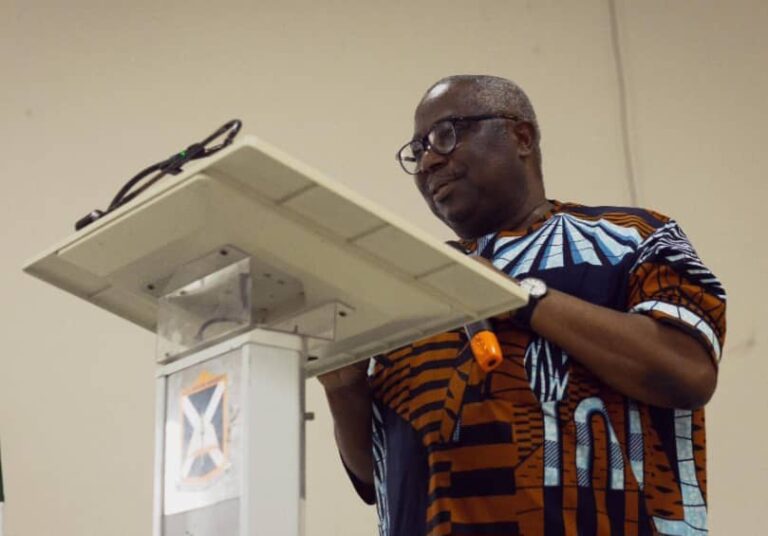Veteran journalist, publisher, and media advocate, Dapo Olorunyomi, OON, has called on the Nigerian media industry to embrace innovation, deepen its democratic role, and resist growing threats from political repression, economic pressures, and digital disruptions.
Mr. Olorunyomi, who is also an advisor to DevReporting made these remarks during a public lecture he delivered at the Faculty of Communication and Media Studies, Ajayi Crowther University, Oyo, on Thursday.
The lecture, titled “Nigerian Journalism Under the Digital and Democratic Crossfire,” drew a large audience of students, academics, journalists, and civic leaders, and sparked a lively conversation about the future of journalism in Nigeria.
Before the lecture, Mr. Olorunyomi was warmly received in the office of the Vice Chancellor, Professor Timothy Abiodun Adebayo, alongside other members of the university’s academic community. The vice chancellor commended him for his distinguished career in journalism and his tireless efforts to strengthen democracy and accountability in Nigeria through fearless reporting and institutional innovation.
“Your work has not only advanced the frontiers of journalism but also inspired countless young Nigerians to believe in the power of truth and civic responsibility,” Professor Adebayo remarked.
In his lecture, Mr. Olorunyomi began by reflecting on the enduring legacy of Bishop Samuel Ajayi Crowther and his contributions to the development of Nigeria’s public sphere. He noted that Crowther’s pioneering work in education, literacy, and cultural bridge-building laid the foundation for the libertarian ideals that would later define Nigeria’s vibrant press and civic discourse.
READ ALSO: Democracy Day: DevReporting advisor, Dapo Olorunyomi, reacts to receiving Nigeria’s national honour
He highlighted how Crowther’s establishment of Africa’s first girls’ secondary school and his lesser-known initiative, The Academy — a public square for citizens to engage in intellectual debates — promoted a blend of indigenous identity and global influences.
“Crowther’s legacy reminds us,” he said, “that journalism and public discourse remain indispensable to our ongoing struggle for substantive independence and democracy.”
He then traced the trajectory of Nigerian journalism — from its colonial origins as a tool for civic education and anti-colonial resistance, through the dark era of military dictatorship marked by repression and resilience, to the present-day challenges and opportunities in the digital age.
He described journalism as “both a mirror and a motor of democracy,” explaining that its effectiveness rests on four critical functions: providing credible information, holding power to account, amplifying marginalized voices, and creating spaces for public debate and deliberation.
Mr. Olorunyomi noted that while digital technologies have democratized the production and dissemination of news, they have also exposed the media to serious challenges such as disinformation, surveillance, algorithmic manipulation by global tech platforms, and increasing threats to journalist safety.
He warned that political and regulatory overreach—as seen in past episodes like the Twitter ban and proposed social media bills—continues to undermine press freedom, while economic pressures and elite ownership of media houses compromise editorial independence.
Highlighting case studies from the #EndSARS protests, Premium Times’ investigative journalism, and recent disinformation campaigns around the #EndBadGovernance protests, he illustrated both the resilience and vulnerability of the press in the face of adversity.
Looking ahead, Mr. Olorunyomi identified key priorities for the survival and flourishing of Nigerian journalism: strengthening institutional resilience, investing in media literacy, embracing fact-checking and cross-border collaborations, responsibly integrating AI into newsroom workflows, and advocating balanced regulatory frameworks that respect press freedom while ensuring accountability from global platforms.
READ ALSO: CJID appoints Babatunde as executive director, elevates Abodunde
“The future of Nigerian journalism,” he concluded, “will depend on how effectively we — as journalists, regulators, educators, and citizens — navigate the possibilities and perils of our time to ensure that journalism remains a pillar of our democracy.”
The event, held at the Modupe Folorunso Alakija Auditorium of the university, was hosted by Professor O. F. Alabi, Dean of the Faculty of Communication and Media Studies, and featured questions and reflections from students and faculty, who praised Mr. Olorunyomi for his thought-provoking insights and unwavering commitment to the ideals of the profession.
The lecture reaffirmed journalism’s indispensable place in Nigeria’s democratic journey and left participants with a renewed sense of responsibility to protect and innovate the craft in the public interest.

